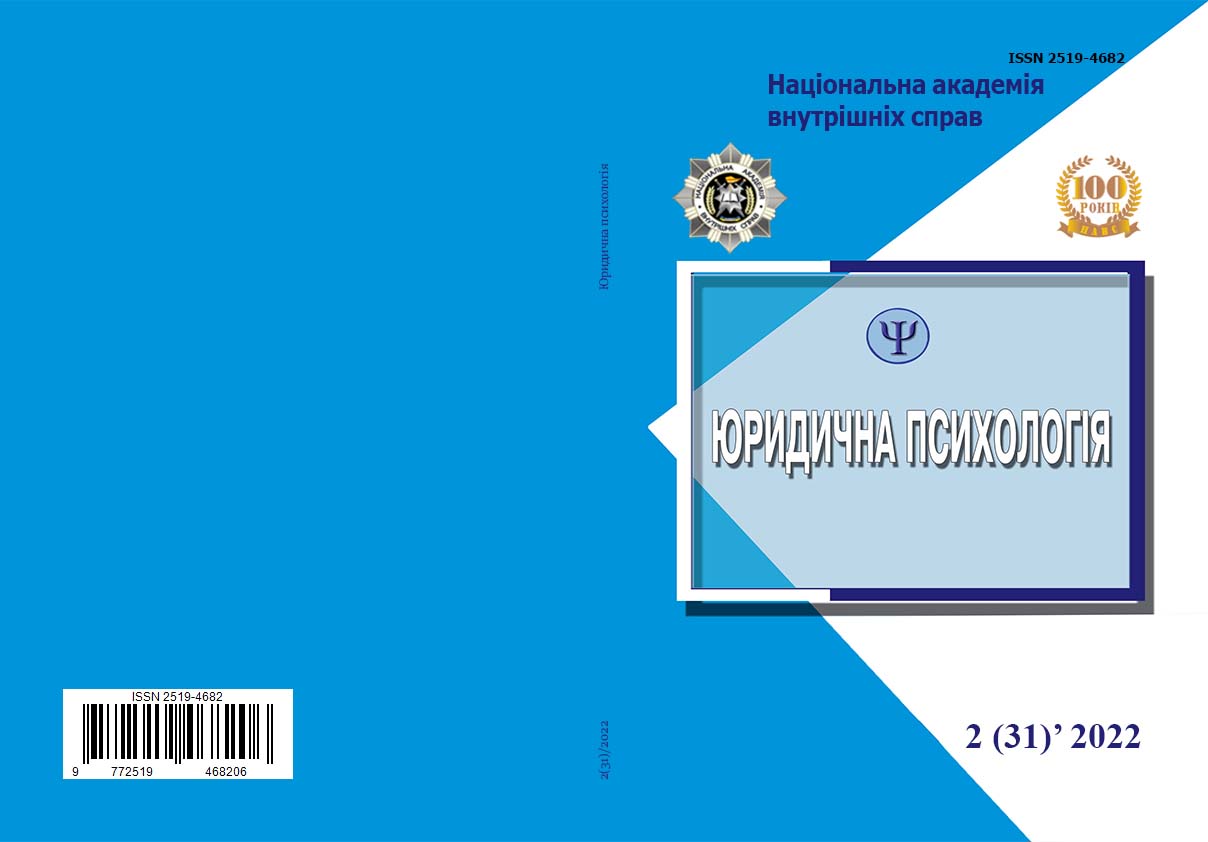Concepts of Special Medical Knowledge Used during Homicide Investigations
Abstract
Understanding the event of a criminal offense, especially such a socially dangerous type as murder, requires the investigator to conduct a comprehensive, objective and complete study of all its circumstances. In order to achieve the specified task, investigators involve knowledge from various fields of science, technology, arts and crafts, which are used in criminal proceedings as special ones, in the pre-trial investigation. The purpose of the article is to provide a description of special medical knowledge that is involved in criminal proceedings during the investigation of murders, to form a theoretical basis for their use. Methodology. To achieve the goal, the work uses general scientific and special methods, in particular: methods of formal logic (analysis, synthesis), comparative legal and historical legal methods. Scientific novelty. It was established that special medical knowledge used in criminal proceedings should be understood as knowledge inherent in professional medical activity, which is applied by competent subjects in order to achieve the objectives of criminal proceedings. Special medical knowledge requires that the subject who applies it. had thorough and professional knowledge in the field of medicine, which is evidenced by the availability of appropriate education and the acquisition of work experience in the specialty. The most common types of involvement of specialist knowledge during homicide investigations are the participation of a medical specialist during the examination of the scene and the examination of the corpse. Also, a specialist in the field of medicine provides assistance to the investigator when drawing up a plan of investigative (search) action, during which special medical knowledge will be involved (examination, survey, exhumation of the corpse, presentation of the corpse for identification), advises the investigator on the optimal ways of checking the proposed versions, obtaining and securing new evidentiary information; the specialist participates in the joint definition of the applied means, methods, methods of activity. Conclusions. Forms of the use of special medical knowledge in criminal proceedings during the investigation of murders are singled out: the involvement of a specialist in the field of medicine in conducting investigative (search) actions; conducting forensic and other types of examinations; consultations with medical specialists in matters of medical science and practice; receiving written certificates from medical specialists on issues related to the investigation; use of departmental materials of the forensic medical examination bureau (examination reports, biological, chemical and other studies), as well as various medical documentation of polyclinics and hospitals for the purposes of proof; performance by medical specialists at the request of investigation bodies, the prosecutor and the court of research, inspections and provision of information, etc.
Keywords: criminal proceedings; special knowledge; specialist; forensic examination; consultation.
Downloads
References
Бідняк Г. С. Теорія і практика використання спеціальних знань при розслідуванні шахрайств : монографія. Дніпро : ДДУВС, 2019. 152 с.
Даніч Є. О. Використання спеціальних знань під час проведення слідчого експерименту : дис. … канд. юрид. наук : 12.00.09. Київ, 2019. 238 с.
Дуфенюк О. М. Розслідування воєнних злочинів: логістичні, криміналістичні та судово-медичні питання. Юридичний науковий електронний журнал. 2022. № 4. С. 369–374. DOI: https://doi.org/10.32782/2524-0374/2022-4/88.
Когутич І. І. Окремі питання сутності та форм використання спеціальних знань у кримінальному провадженні. Вісник Академії адвокатури України. 2015. Т. 12. № 2 (33). С. 121–123.
Галдецька І. Г. Правові та наукові основи використання спеціальних медичних знань при розслідуванні злочинів : дис. … канд. юрид. наук : 12.00. 09. Київ, 2011. 231 с.
Ковалевська Є. В. Використання спеціальних медичних знань під час розслідування злочинів : автореф. дис. … канд. юрид. наук : 12.00.09. Київ, 2018. 20 с.
Ковальов К. М. Спеціальні знання в судовій експертизі визначення давності документа. Правовий часопис Донбасу. 2021. № 2 (75). С. 140–152. DOI: https://doi.org/10.32366/2523-4269-2021-75-2-140-152.
Матусовський Г. А. Криминалистика в системе научных знаний. Харьков : Вища шк., 1976. 113 с.
Пілюков Ю. Використання спеціальних знань у кримінальних провадженнях. Актуальні проблеми правознавства. 2019. № 4 (20). С. 240–245. DOI: 10.35774/app2019.04.240.
Кримінальний кодекс України : Закон України від 5 квіт. 2001 р. № 2341-III. URL: http://zakon4.rada.gov.ua/laws/show/2341-14.
Кримінальний процесуальний кодекс України : Закон України від 13 квіт. 2012 р. № 4651-VI. URL: http://zakon2.rada.gov.ua/laws/show/4651-17.
Чорноус Ю. М. Надання першої допомоги потерпілим під час розслідування втечі з місця позбавлення волі. Науковий вісник Міжнародного гуманітарного університету. 2021 № 52. С. 81–84. (Серія «Юриспруденція»). DOI: https://doi.org/10.32841/2307-1745.2021.52.18.
Abstract views: 203 PDF Downloads: 126
- Authors reserve the right to authorship of their own work and transfer to the magazine the right of the first publication of this work under the terms of the Creative Commons Attribution License, which allows other persons to freely distribute published work with mandatory reference to authors of the original work and the first publication of an article in this magazine.
- Authors have the right to enter into separate additional agreements on non-exclusive dissemination of the work in the form in which it was published in the journal (for example, to post an article in the institution's repository or to publish as part of a monograph), provided that the link to the first publication of the work in this journal is maintained.
- The journal's policy allows and encourages the posting of articles by authors on the Internet (for example, in electronic storehouses of institutions or on personal websites), both before the submission of this manuscript to the editorial office and during its editorial processing, as this contributes to the creation of a productive scientific discussion and positively affects the efficiency and dynamics of citing the published work.




